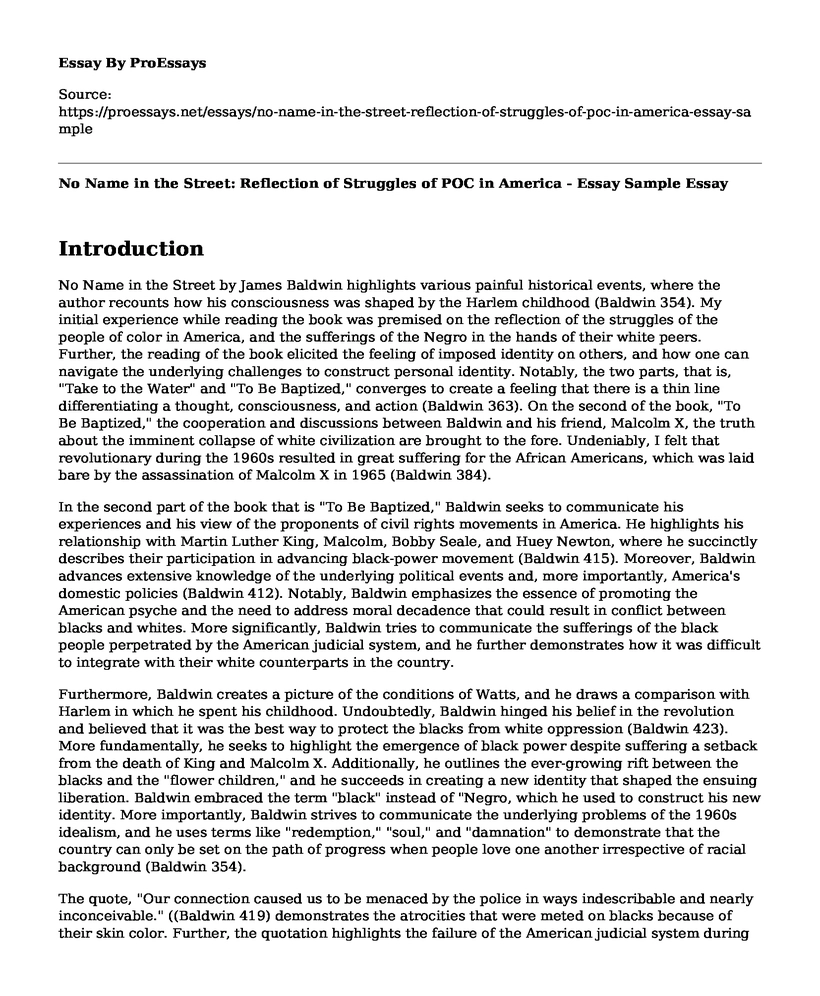Introduction
No Name in the Street by James Baldwin highlights various painful historical events, where the author recounts how his consciousness was shaped by the Harlem childhood (Baldwin 354). My initial experience while reading the book was premised on the reflection of the struggles of the people of color in America, and the sufferings of the Negro in the hands of their white peers. Further, the reading of the book elicited the feeling of imposed identity on others, and how one can navigate the underlying challenges to construct personal identity. Notably, the two parts, that is, "Take to the Water" and "To Be Baptized," converges to create a feeling that there is a thin line differentiating a thought, consciousness, and action (Baldwin 363). On the second of the book, "To Be Baptized," the cooperation and discussions between Baldwin and his friend, Malcolm X, the truth about the imminent collapse of white civilization are brought to the fore. Undeniably, I felt that revolutionary during the 1960s resulted in great suffering for the African Americans, which was laid bare by the assassination of Malcolm X in 1965 (Baldwin 384).
In the second part of the book that is "To Be Baptized," Baldwin seeks to communicate his experiences and his view of the proponents of civil rights movements in America. He highlights his relationship with Martin Luther King, Malcolm, Bobby Seale, and Huey Newton, where he succinctly describes their participation in advancing black-power movement (Baldwin 415). Moreover, Baldwin advances extensive knowledge of the underlying political events and, more importantly, America's domestic policies (Baldwin 412). Notably, Baldwin emphasizes the essence of promoting the American psyche and the need to address moral decadence that could result in conflict between blacks and whites. More significantly, Baldwin tries to communicate the sufferings of the black people perpetrated by the American judicial system, and he further demonstrates how it was difficult to integrate with their white counterparts in the country.
Furthermore, Baldwin creates a picture of the conditions of Watts, and he draws a comparison with Harlem in which he spent his childhood. Undoubtedly, Baldwin hinged his belief in the revolution and believed that it was the best way to protect the blacks from white oppression (Baldwin 423). More fundamentally, he seeks to highlight the emergence of black power despite suffering a setback from the death of King and Malcolm X. Additionally, he outlines the ever-growing rift between the blacks and the "flower children," and he succeeds in creating a new identity that shaped the ensuing liberation. Baldwin embraced the term "black" instead of "Negro, which he used to construct his new identity. More importantly, Baldwin strives to communicate the underlying problems of the 1960s idealism, and he uses terms like "redemption," "soul," and "damnation" to demonstrate that the country can only be set on the path of progress when people love one another irrespective of racial background (Baldwin 354).
The quote, "Our connection caused us to be menaced by the police in ways indescribable and nearly inconceivable." ((Baldwin 419) demonstrates the atrocities that were meted on blacks because of their skin color. Further, the quotation highlights the failure of the American judicial system during the 1960s, and how most radical figures were taken prisoners for depicting revolutionary tendencies that were aimed at liberating the blacks in America. More significantly, the quote illustrates the rift that was evident between whites and blacks and how being spotted with the former could attract mistreatment from the American police.
Work Cited
Baldwin, James. "No Name in the Street." Collected Essays, 1998, pp. 349-475.
Cite this page
No Name in the Street: Reflection of Struggles of POC in America - Essay Sample. (2023, Apr 19). Retrieved from https://proessays.net/essays/no-name-in-the-street-reflection-of-struggles-of-poc-in-america-essay-sample
If you are the original author of this essay and no longer wish to have it published on the ProEssays website, please click below to request its removal:
- David Sedaris' Welcome to French Class Critical Analysis Essay
- A Deconstructive Analysis of Robert Frost's The Road Not Taken Essay
- An Essay on "A Smart Cookie" From "The House on Mango Street"
- Literary Analysis Essay on The Story of an Hour by Kate Chopin: A Tragic Tale of Louise Mallard's Heartbreaking Loss
- White Elephants, Emotional Conflict: Hemingway's Tone - Research Paper
- The Hero: A Journey to Conquer Self and World - Essay Sample
- Joker: A Unique, Complex Antihero and Disruptor - Essay Sample







